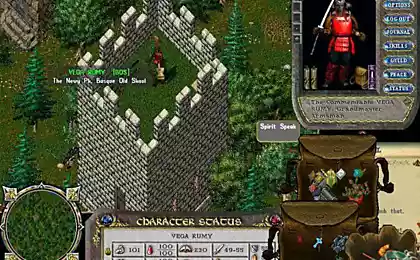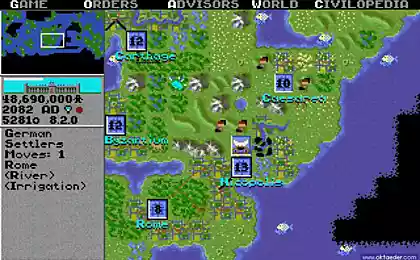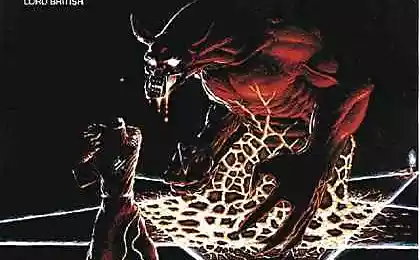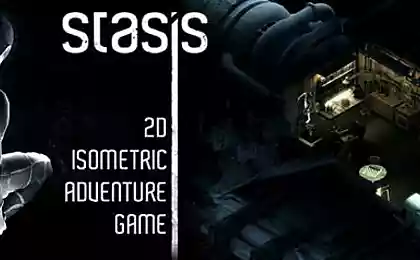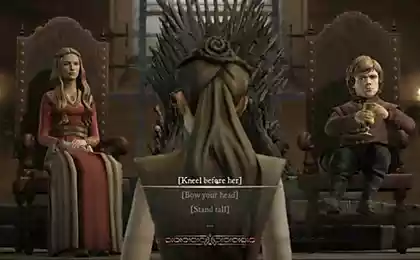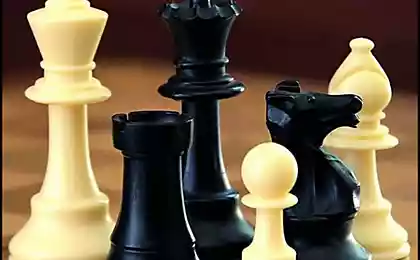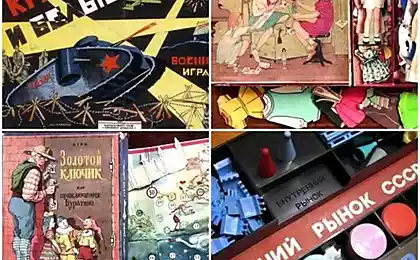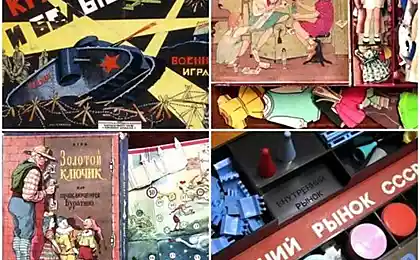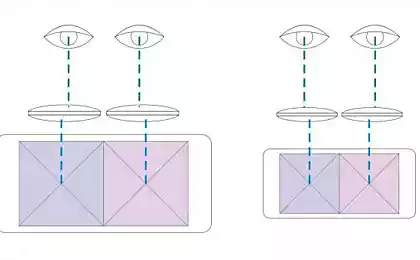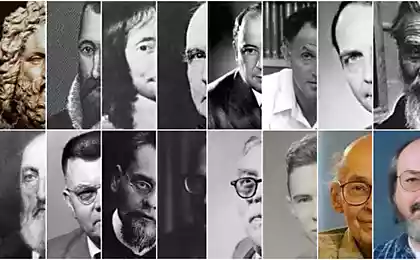980
Games Mathematicians
Mathematicians always strive to describe our life as a formula. Sometimes it turns out very clearly. But this is only as long as the game does not come purely human variables - conscience, confidence, thirst for justice, selfishness, altruism. There math stops working and starts at least psychology. We have selected ten of the brightest intellectual games, which are based life in all its manifold manifestations.
Text: Mikhail Petrov, Yuliya Ignatenko, Igor Grigoriev, Alexander Sorokin (School of Science Journalism "PP" - MGPPU)
Illustrations: vlapa
Chestnostyreno
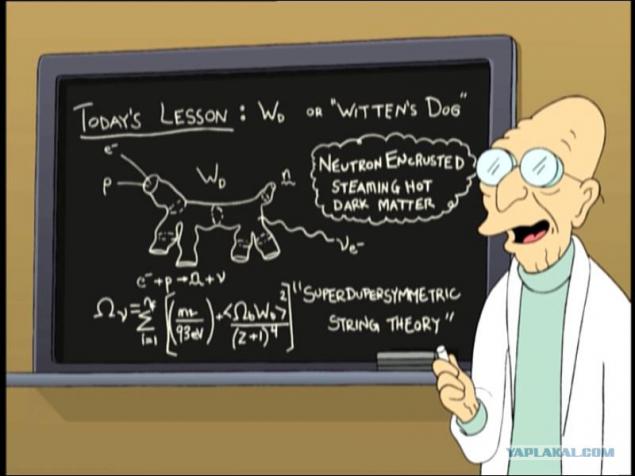
1. "Prisoner's Dilemma": pounding, or remain silent?
Rules Imagine that you have tried to rob a bank. But, alas, you and your accomplice caught and were seated in different cells. The investigator proposes a deal: you give testimony against his partner and then get a chance to be released for helping the investigation. You have four choices.
1. You agree to and give testimony. Your partner is silent. Then he gets ten years, and you are released.
2. inject you and your partner is pricked. Then you get two for two years.
3. You proudly silent, but your co-defendant is testifying. Then he comes to freedom, and you get ten years.
4. Both of you are silent, and six months later you released for lack of evidence.
And what do you choose? The investigator has already opened the door of your camera ...
History and application of the basic model of the "Prisoner's Dilemma" was offered in 1950 by the American mathematicians Merrill Flood and Melvin Dresher, who worked on the research corporation RAND. This game needed to predict the nuclear arms race - as concluded by the Soviet Union and the United States.
Since then the game has become very popular among mathematicians, philosophers and psychologists. Leaving the military criminal cover, you can find many other examples. The same arms race is now very similar to advertising campaigns. Constant competition in the amount of advertising content steadily increases the costs of firms. Accordingly, the termination of the race would benefit all parties. But if someone has treacherously broke the truce, he will win the war for the consumer, and the other will lose.
In the US, even the competitions between teams of universities for the best strategy game programmed in the "prisoner's dilemma", where victory is awarded for a minimum term of imprisonment on the basis of several rounds of questioning. The winning program based on the principle of "an eye for an eye": it has done with every partner is exactly as it did before the course. But it's still mathematics, human life is much more complicated.
Human qualities in reality you are unlikely to rob banks. A Russian investigators would not offer such a deal. It is a model, a parable, a metaphor for human relationships.
To the total sentence was smallest profitable both silent. Then, the total period of his release will be a year - much less than in any other scenario. But how much do you trust the person with whom went to the business? And he to you? And that mean to you his interests? To what extent are you willing to risk?
The main problem of the "Prisoner's Dilemma" - trust. It is because of the reluctance to trust the other and there is a conflict of interest, which is built into an absolute, for example, the writers of horror series "Saw." Thus, in the fifth part of the heroes can literally shake a little blood to get out of the trap. Instead, they begin to compete, which leads to the death of most of them.

2. "ultimatum": how much you are willing to pay for justice?
Rules Two players are invited to share between them a sum of money, say 1,000 rubles. The first of them, feed, offers his version of the division, for example every 500 rubles, or the 800, and the partner - 200 and so on. D. The second player receiving may either agree to the proposed terms and to get their share, or reject circuit section . In the second case, nobody gets paid - they go back to the bank.
History and application of rules of the game were first formulated in 1982 in the Journal of Economic Behaviour and Organization to describe the process of negotiations. Easy modeling and paradoxical results, it quickly became a favorite object of study for scientists around the world. The game "Ultimatum" is suitable for many situations. For example, when the question is how much of the profit be spent on staff salaries, and which give the owners of the company.
Human qualities What would you do in place of the host? Assuming rationality, it is necessary to agree on any version of the section of money. Even if you want to pick up a feed 990 rubles, it is still not worth it to argue: 10 rubles still greater than zero. But in addition there is the rationality and justice.
In hundreds of experiments conducted by feeding more often offer their companions from 50 to 30%. Somewhere in the range of 30 to 20% taking begin to abandon the transaction by choosing the principle of "It does not get you to anybody!».
Understanding of justice depends on the culture. Peruvian Indians, for example, were inclined to accept almost any offer, and Asians were much scrupulousness and recalcitrant Americans. In one of the experiments carried out in Indonesia, the subjects refused to even amounts of a few of their monthly salaries.
In general, many psychologists did whatever the topic of the game "ultimatum." It turned out that the results of the experiment is affected by many factors: sexual arousal, age, degree of aggressiveness, testosterone levels, and so on.
In 2003, the journal Science published an article about a study in which brain function players in the "Ultimatum" is continuously monitored by MRI. It turned out that after receiving a quotation activated the insula of the brain, the upper region of the frontal cortex and cingulate gyrus. The first of these areas is considered to be responsible for processing and formation of negative emotional information, and the other two - for cognitive processes, and self-selection. The outcome of this confrontation between the ancient mechanism of emotions and acquired rational thinking and determines the final decision.
The experiments gave unexpected results. Subjects were artificially blocked the work of rational frontal cortex. It seems to be allocated for free should be furious emotions reject all the unjust sentence. But it turned out the opposite: the players have become much more flexible and pliable, the emotions of anger and resentment gave way innate sense of greed. It turns out that the same rational activity of the frontal cortex and leads to a deviation from a reasonable mathematical strategies and ideas about honor and justice are forcing people to make a balanced decision-disadvantage. No wonder the experiments carried out on groups of autistic failure rate was significantly lower. Deprived of social prejudices, they are much more likely to follow the ideal mathematical model.
- The interaction of cognitive and emotional decision-making mechanisms and determine rational behavior and violation of any of them leads to the selection of non-optimal strategies. The two systems also can conflict, resulting in many examples of utilitarian thinking leads to disastrous consequences, and directly contrary to morality - says Anna Shestakova, a senior fellow at the Center for Neurocognitive Research MGPPU.
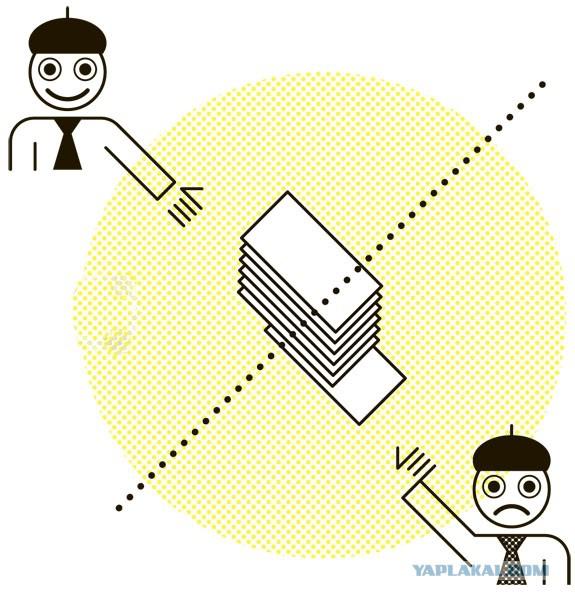
3. The "tragedy of the commons field": if all will go well
Regulations Villagers possess a common pasture. If everyone will feed a cow on it, then do not worry, the grass enough. If someone wants to take a second, it seemed to be all right, too: something big field. But if everyone will graze two cows, the grass on the field is not enough pasture depleted, begins hunger.
History and use of this model proposed by William Forster Lloyd in 1833 in a book dedicated to the overpopulation.
- The tragedy of communities often happens in life - played out a classic scenario of the game theory. Examples of this weight: environmental problems, traffic jams - any place where a person seems like a freebie can be discreetly profit at the expense of society - explains Professor NES Alex Savvateev.
The examples do not need to go far. In Moscow, where traffic jams have become an enormous problem, and environmental situation is deteriorating year after year, the residents stubbornly ignore public campaign "Day without cars", since 2008. Moreover, according to some, on this day the amount of congestion is particularly high.
Articles with various modifications of this game appeared in leading scientific journals such as Science in our time. For example, there is a variant of the experiment called "public goods". Here is how it is described by scientists from the Higher School of Economics Dilara Valeyeva and Maria Yudkevich: "Each of the participants originally endowed a certain sum of money. Everyone should privately to decide what proportion of personal money it can invest in the public good. Investments in public good money increased several times and divided equally. The group will receive the maximum benefit if each member invests his entire initial amount of money. However, players may shy away from investing their money in public enterprises. In equilibrium, the theory predicted, each participant makes a zero contribution. In real experiments, the outcome is usually different: the players are investing a certain amount of public good ».
Human qualities We do not consider sin cause little harm nature or society. "From a single piece of paper thrown world will not collapse" - so says a passer, and the cities are overgrown with mountains of garbage.
Sociologists and psychologists have long been trying to figure out how to get people to be more altruistic. One method - human involvement in the process, giving him a sense of pride in the born good or harm reduction. For example, in the Summer School "Russian reporter" students are offered to make a contribution in the amount of 150 to 600 rubles per day - depending on the financial possibilities. If some of the participants will make a minimum contribution, nothing terrible will happen. But if you go all the way, the Summer School will be doomed to food shortages and other problems. It seems that saves us a sense of belonging, "This is my project, I was responsible for it, too." At least, the last few years, the average fee was twice the minimum.
In the same series distribution of music via the Internet. Some groups offer their works for free download, and then listened to, pay any amount. If you do not pay anybody, no matter what the group will record a new album.
Some economists believe that it is for the future of such schemes, at least in the area of distribution of music, books and movies. For example, a professor at the Higher School of Economics Alexander Dolgin introduces the concept of "postfaktumnye gratuity payments." In his scheme, the economy of the future will be able to defeat the freeloaders from public evaluation. When I read the book or watched the movie, I have to put my personal assessment - the extent to which I liked. And it would be illogical, if I put the highest score and do not sacrifice the author of a considerable sum.

4. "trolley problem": whether it is possible to kill a man of humanism
Rules on the railway is about to happen accident. Trolley filled with passengers heading for the abyss. You have the option to save it. To do this, push your hands on the rails fatted road worker, who happened to be nearby. Man dies. But dozens of lives will be saved. Are you ready?
History and use of original wording of this painful dilemma was proposed in 1967 by the British philosopher Philippa Foot as a thought experiment on ethics. Over the years there have been a lot of modifications. You kill one, and saving three. You kill the baby and save the life of ten of them. There's even a high-pitched short film in which switchman must choose: to crush his own son of bridges or prevent a train wreck with hundreds of passengers.
The most common place of use of this dilemma, of course, war. Leaving the squad to cover the retreat of the regiment, the commander sends to his death thirty people, but a chance thousand. But this situation can happen on a real railroad. Or during a fire. Or somewhere else.
Not sure we should talk about life and death. Imagine that you are the head of the department to which you want to fire a staff member to keep the whole team. Or are you a lesson in school, and you have to yell at a child, to the rest of the class could safely go.
Human qualities in this game is very little math: ten - more than one, it is even a first grader knows. But the psychology of ethics in this dilemma in bulk. The commandment "Thou shalt not kill" is in conflict with the value of the preservation of life. By the way, in a short film about a switchman protagonist still sacrifice his son and train with unsuspecting passengers quietly goes further.
In an experiment conducted by psychologists at the University of Michigan, the subject is asked a realistic three-dimensional model with the trolley, and the need for ways to kill one to save five. About 90% of the transferred arrow and killed a man for the sake of passenger wagons. But it's still a computer reality, not real life.
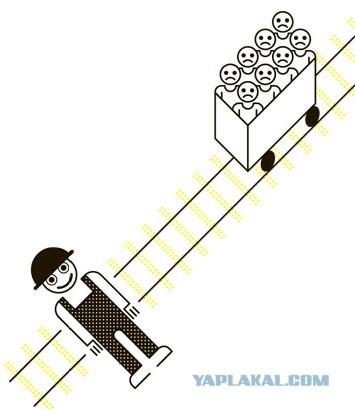
5. "Hawks and Doves": to attack or flee
Rules In one animal populations co-exist two groups with different strategies for resources. First, the "hawks" are always tuned to the conflict, and at a meeting with a competitor go through. As a result, they either win and assign all the resources in the area (50 points), or lose and get seriously injured in a fight (-100 points). "Pigeons", in contrast, set peacefully. Seeing the "hawk", they immediately retreat (0 Points "dove" and 50 points, "hawk"), and at a meeting with his relatives only represent a willingness to fight. After a lengthy exchange of threats (-10 points to both "blue") resources gets more successful "blue" (50 points).
There are many other variations of the rules, but the main features of the game remain unchanged: win brings any bird average number of points, getting injuries from the "hawks" is equivalent to a huge fine and ritual battle "doves" also requires some minimal costs.
The aim of the game is extremely simple: to earn maximum points, that would be for them no hiding - food, money, female or "representation of individual genes in the gene pool of the population," as Richard Dawkins in his book "The Selfish Gene».
History and application of rules of the game were first published in the journal Nature in 1973. The authors proposed to formalize the conflict as animals for resources, territory, or sexual partners. The model allows for correlation of strategies in a population to calculate the amount of resources spent and received by individuals at a particular variant interactions. Avian geopolitical metaphor borrowed from the slang of the time ("hawks" - for a tough confrontation with the enemy, "doves" - for detente and trade-offs).
"Hawks and Doves" appeared as the development of the game in which two drivers drive toward each other. The loser is the one who scared the first head-on collision and swerve to the side.
Human qualities - We have tried to move away from the classical theory of games in which a set of possible strategies for small and tightly defined, - says Mikhail Burtsev, head of the laboratory neyrointellekta neuromorphic systems and the Kurchatov Institute. In 2007, he along with his supervisor Peter Turchin in Nature published an article that described how the strategy of "hawks" and "doves" occur naturally in the evolution of the computer model.
- We have created a virtual world populated by agents who commit primitive actions that could be combined into more complex strategy. The behavior of individual agents to manage their own neural network. This allowed us to discover the strategies that in the standard game theory did not occur to investigate, - says Mikhail.
So in the process of evolution of the computer world it appeared his peace-loving "blue", "hawks" who attack all outsiders, and even "starlings" are favored in the face of danger. But the most interesting - that these agents became apparent mathematical sublime human feelings: caring for relatives, self-sacrifice and altruism.
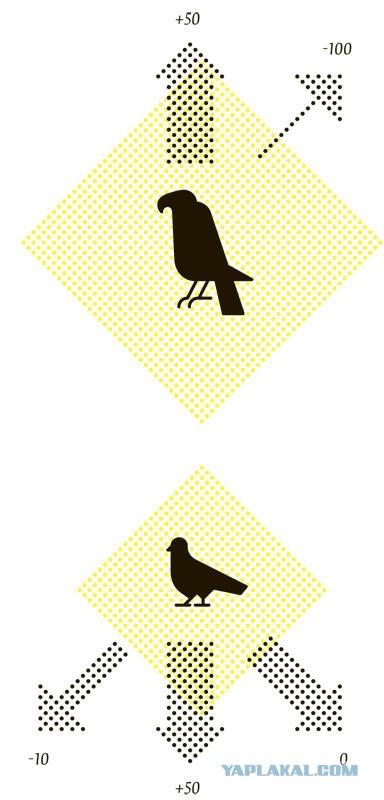
6. "Pascal's Wager": God and the benefit
Regulations Each of us in his relationship with God is free to choose between belief and unbelief.
Source: http: //
Text: Mikhail Petrov, Yuliya Ignatenko, Igor Grigoriev, Alexander Sorokin (School of Science Journalism "PP" - MGPPU)
Illustrations: vlapa
Chestnostyreno

1. "Prisoner's Dilemma": pounding, or remain silent?
Rules Imagine that you have tried to rob a bank. But, alas, you and your accomplice caught and were seated in different cells. The investigator proposes a deal: you give testimony against his partner and then get a chance to be released for helping the investigation. You have four choices.
1. You agree to and give testimony. Your partner is silent. Then he gets ten years, and you are released.
2. inject you and your partner is pricked. Then you get two for two years.
3. You proudly silent, but your co-defendant is testifying. Then he comes to freedom, and you get ten years.
4. Both of you are silent, and six months later you released for lack of evidence.
And what do you choose? The investigator has already opened the door of your camera ...
History and application of the basic model of the "Prisoner's Dilemma" was offered in 1950 by the American mathematicians Merrill Flood and Melvin Dresher, who worked on the research corporation RAND. This game needed to predict the nuclear arms race - as concluded by the Soviet Union and the United States.
Since then the game has become very popular among mathematicians, philosophers and psychologists. Leaving the military criminal cover, you can find many other examples. The same arms race is now very similar to advertising campaigns. Constant competition in the amount of advertising content steadily increases the costs of firms. Accordingly, the termination of the race would benefit all parties. But if someone has treacherously broke the truce, he will win the war for the consumer, and the other will lose.
In the US, even the competitions between teams of universities for the best strategy game programmed in the "prisoner's dilemma", where victory is awarded for a minimum term of imprisonment on the basis of several rounds of questioning. The winning program based on the principle of "an eye for an eye": it has done with every partner is exactly as it did before the course. But it's still mathematics, human life is much more complicated.
Human qualities in reality you are unlikely to rob banks. A Russian investigators would not offer such a deal. It is a model, a parable, a metaphor for human relationships.
To the total sentence was smallest profitable both silent. Then, the total period of his release will be a year - much less than in any other scenario. But how much do you trust the person with whom went to the business? And he to you? And that mean to you his interests? To what extent are you willing to risk?
The main problem of the "Prisoner's Dilemma" - trust. It is because of the reluctance to trust the other and there is a conflict of interest, which is built into an absolute, for example, the writers of horror series "Saw." Thus, in the fifth part of the heroes can literally shake a little blood to get out of the trap. Instead, they begin to compete, which leads to the death of most of them.

2. "ultimatum": how much you are willing to pay for justice?
Rules Two players are invited to share between them a sum of money, say 1,000 rubles. The first of them, feed, offers his version of the division, for example every 500 rubles, or the 800, and the partner - 200 and so on. D. The second player receiving may either agree to the proposed terms and to get their share, or reject circuit section . In the second case, nobody gets paid - they go back to the bank.
History and application of rules of the game were first formulated in 1982 in the Journal of Economic Behaviour and Organization to describe the process of negotiations. Easy modeling and paradoxical results, it quickly became a favorite object of study for scientists around the world. The game "Ultimatum" is suitable for many situations. For example, when the question is how much of the profit be spent on staff salaries, and which give the owners of the company.
Human qualities What would you do in place of the host? Assuming rationality, it is necessary to agree on any version of the section of money. Even if you want to pick up a feed 990 rubles, it is still not worth it to argue: 10 rubles still greater than zero. But in addition there is the rationality and justice.
In hundreds of experiments conducted by feeding more often offer their companions from 50 to 30%. Somewhere in the range of 30 to 20% taking begin to abandon the transaction by choosing the principle of "It does not get you to anybody!».
Understanding of justice depends on the culture. Peruvian Indians, for example, were inclined to accept almost any offer, and Asians were much scrupulousness and recalcitrant Americans. In one of the experiments carried out in Indonesia, the subjects refused to even amounts of a few of their monthly salaries.
In general, many psychologists did whatever the topic of the game "ultimatum." It turned out that the results of the experiment is affected by many factors: sexual arousal, age, degree of aggressiveness, testosterone levels, and so on.
In 2003, the journal Science published an article about a study in which brain function players in the "Ultimatum" is continuously monitored by MRI. It turned out that after receiving a quotation activated the insula of the brain, the upper region of the frontal cortex and cingulate gyrus. The first of these areas is considered to be responsible for processing and formation of negative emotional information, and the other two - for cognitive processes, and self-selection. The outcome of this confrontation between the ancient mechanism of emotions and acquired rational thinking and determines the final decision.
The experiments gave unexpected results. Subjects were artificially blocked the work of rational frontal cortex. It seems to be allocated for free should be furious emotions reject all the unjust sentence. But it turned out the opposite: the players have become much more flexible and pliable, the emotions of anger and resentment gave way innate sense of greed. It turns out that the same rational activity of the frontal cortex and leads to a deviation from a reasonable mathematical strategies and ideas about honor and justice are forcing people to make a balanced decision-disadvantage. No wonder the experiments carried out on groups of autistic failure rate was significantly lower. Deprived of social prejudices, they are much more likely to follow the ideal mathematical model.
- The interaction of cognitive and emotional decision-making mechanisms and determine rational behavior and violation of any of them leads to the selection of non-optimal strategies. The two systems also can conflict, resulting in many examples of utilitarian thinking leads to disastrous consequences, and directly contrary to morality - says Anna Shestakova, a senior fellow at the Center for Neurocognitive Research MGPPU.

3. The "tragedy of the commons field": if all will go well
Regulations Villagers possess a common pasture. If everyone will feed a cow on it, then do not worry, the grass enough. If someone wants to take a second, it seemed to be all right, too: something big field. But if everyone will graze two cows, the grass on the field is not enough pasture depleted, begins hunger.
History and use of this model proposed by William Forster Lloyd in 1833 in a book dedicated to the overpopulation.
- The tragedy of communities often happens in life - played out a classic scenario of the game theory. Examples of this weight: environmental problems, traffic jams - any place where a person seems like a freebie can be discreetly profit at the expense of society - explains Professor NES Alex Savvateev.
The examples do not need to go far. In Moscow, where traffic jams have become an enormous problem, and environmental situation is deteriorating year after year, the residents stubbornly ignore public campaign "Day without cars", since 2008. Moreover, according to some, on this day the amount of congestion is particularly high.
Articles with various modifications of this game appeared in leading scientific journals such as Science in our time. For example, there is a variant of the experiment called "public goods". Here is how it is described by scientists from the Higher School of Economics Dilara Valeyeva and Maria Yudkevich: "Each of the participants originally endowed a certain sum of money. Everyone should privately to decide what proportion of personal money it can invest in the public good. Investments in public good money increased several times and divided equally. The group will receive the maximum benefit if each member invests his entire initial amount of money. However, players may shy away from investing their money in public enterprises. In equilibrium, the theory predicted, each participant makes a zero contribution. In real experiments, the outcome is usually different: the players are investing a certain amount of public good ».
Human qualities We do not consider sin cause little harm nature or society. "From a single piece of paper thrown world will not collapse" - so says a passer, and the cities are overgrown with mountains of garbage.
Sociologists and psychologists have long been trying to figure out how to get people to be more altruistic. One method - human involvement in the process, giving him a sense of pride in the born good or harm reduction. For example, in the Summer School "Russian reporter" students are offered to make a contribution in the amount of 150 to 600 rubles per day - depending on the financial possibilities. If some of the participants will make a minimum contribution, nothing terrible will happen. But if you go all the way, the Summer School will be doomed to food shortages and other problems. It seems that saves us a sense of belonging, "This is my project, I was responsible for it, too." At least, the last few years, the average fee was twice the minimum.
In the same series distribution of music via the Internet. Some groups offer their works for free download, and then listened to, pay any amount. If you do not pay anybody, no matter what the group will record a new album.
Some economists believe that it is for the future of such schemes, at least in the area of distribution of music, books and movies. For example, a professor at the Higher School of Economics Alexander Dolgin introduces the concept of "postfaktumnye gratuity payments." In his scheme, the economy of the future will be able to defeat the freeloaders from public evaluation. When I read the book or watched the movie, I have to put my personal assessment - the extent to which I liked. And it would be illogical, if I put the highest score and do not sacrifice the author of a considerable sum.

4. "trolley problem": whether it is possible to kill a man of humanism
Rules on the railway is about to happen accident. Trolley filled with passengers heading for the abyss. You have the option to save it. To do this, push your hands on the rails fatted road worker, who happened to be nearby. Man dies. But dozens of lives will be saved. Are you ready?
History and use of original wording of this painful dilemma was proposed in 1967 by the British philosopher Philippa Foot as a thought experiment on ethics. Over the years there have been a lot of modifications. You kill one, and saving three. You kill the baby and save the life of ten of them. There's even a high-pitched short film in which switchman must choose: to crush his own son of bridges or prevent a train wreck with hundreds of passengers.
The most common place of use of this dilemma, of course, war. Leaving the squad to cover the retreat of the regiment, the commander sends to his death thirty people, but a chance thousand. But this situation can happen on a real railroad. Or during a fire. Or somewhere else.
Not sure we should talk about life and death. Imagine that you are the head of the department to which you want to fire a staff member to keep the whole team. Or are you a lesson in school, and you have to yell at a child, to the rest of the class could safely go.
Human qualities in this game is very little math: ten - more than one, it is even a first grader knows. But the psychology of ethics in this dilemma in bulk. The commandment "Thou shalt not kill" is in conflict with the value of the preservation of life. By the way, in a short film about a switchman protagonist still sacrifice his son and train with unsuspecting passengers quietly goes further.
In an experiment conducted by psychologists at the University of Michigan, the subject is asked a realistic three-dimensional model with the trolley, and the need for ways to kill one to save five. About 90% of the transferred arrow and killed a man for the sake of passenger wagons. But it's still a computer reality, not real life.

5. "Hawks and Doves": to attack or flee
Rules In one animal populations co-exist two groups with different strategies for resources. First, the "hawks" are always tuned to the conflict, and at a meeting with a competitor go through. As a result, they either win and assign all the resources in the area (50 points), or lose and get seriously injured in a fight (-100 points). "Pigeons", in contrast, set peacefully. Seeing the "hawk", they immediately retreat (0 Points "dove" and 50 points, "hawk"), and at a meeting with his relatives only represent a willingness to fight. After a lengthy exchange of threats (-10 points to both "blue") resources gets more successful "blue" (50 points).
There are many other variations of the rules, but the main features of the game remain unchanged: win brings any bird average number of points, getting injuries from the "hawks" is equivalent to a huge fine and ritual battle "doves" also requires some minimal costs.
The aim of the game is extremely simple: to earn maximum points, that would be for them no hiding - food, money, female or "representation of individual genes in the gene pool of the population," as Richard Dawkins in his book "The Selfish Gene».
History and application of rules of the game were first published in the journal Nature in 1973. The authors proposed to formalize the conflict as animals for resources, territory, or sexual partners. The model allows for correlation of strategies in a population to calculate the amount of resources spent and received by individuals at a particular variant interactions. Avian geopolitical metaphor borrowed from the slang of the time ("hawks" - for a tough confrontation with the enemy, "doves" - for detente and trade-offs).
"Hawks and Doves" appeared as the development of the game in which two drivers drive toward each other. The loser is the one who scared the first head-on collision and swerve to the side.
Human qualities - We have tried to move away from the classical theory of games in which a set of possible strategies for small and tightly defined, - says Mikhail Burtsev, head of the laboratory neyrointellekta neuromorphic systems and the Kurchatov Institute. In 2007, he along with his supervisor Peter Turchin in Nature published an article that described how the strategy of "hawks" and "doves" occur naturally in the evolution of the computer model.
- We have created a virtual world populated by agents who commit primitive actions that could be combined into more complex strategy. The behavior of individual agents to manage their own neural network. This allowed us to discover the strategies that in the standard game theory did not occur to investigate, - says Mikhail.
So in the process of evolution of the computer world it appeared his peace-loving "blue", "hawks" who attack all outsiders, and even "starlings" are favored in the face of danger. But the most interesting - that these agents became apparent mathematical sublime human feelings: caring for relatives, self-sacrifice and altruism.

6. "Pascal's Wager": God and the benefit
Regulations Each of us in his relationship with God is free to choose between belief and unbelief.
Source: http: //
